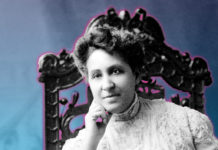It’s bittersweet.
I’m heading home from the NAACP’s national convention having enjoyed being with a large gathering of wonderful people, mostly elders, who are among the most reliable voters in every election, and the first-responders when our social, political, and economic interests are threatened.
I love my people, but they have announced a needlessly divisive education agenda and they are speeding dangerously in a direction that threatens to alienate millions of parents, students, and educators who see the need for alternatives to traditional public schools.
Yesterday at the convention delegates passed a resolution on education with only two parts.
The first was a call to mandate character and civics education. It’s a little old school for me, and it basically creates an Office of Respectability Politics in public education, but, if you’re into that sort of thing, I’m neutral.
But, the second part calls for charter schools to be more accountable to the public and transparent about their finances.
I support the call for accountability in schools that operate independent of school districts. Charter schools need the freedom to be innovative, but we can’t tolerate them being unfair to students, uncaring about communities, or untrustworthy with public money.
At their best charters are creating hope and opportunity for black families in education deserts. At their worst charters reshuffle offer little more than a mirage in that desert.
Still, even if the NAACP’s most audacious goals for charter school accountability are achieved, the major impediments vexing public education will remain stable. The systemic problems in public schools will continue to diminish the promise of millions of black children.
Let’s back up. I’m getting ahead of myself.
For context, in July 2016 the NAACP’s 107th National Convention passed a resolution calling for a “moratorium on the proliferation of privately managed charter schools.” That built on resolutions from previous years aimed at defeating “privatization” in public education.
If last year’s resolution was meant to create a buzz, it did. In spades.
Charter school supporters of every stripe, me included, railed against the moratorium. Many of us dismissed it as a shameless quid pro quo motivated by financial support to the NAACP from the American Federation of Teachers and the National Education Association.
The AFT and NEA are the two most politically powerful and cash strong organizations in the nation. Education is a $600 billion business. Business is good. It’s theirs. Parents in poverty, and their children, have no such entities with equal power to defend their best interests.
In response to their critics the NAACP established a task force to investigate the impact of charters on traditional school districts. Between December 2016 and April 2017 that task force conducted seven public hearings in Connecticut, Memphis, Orlando, Los Angeles, Detroit, New Orleans, and New York. At each stop charter school opponents and supporters were given equal time to testify, share data, and answer questions.
All along Alice Huffman, president of the California state NAACP where the moratorium resolution originated said the information would be compiled and shared with public.
She made good on that promise. This week the task force released a report that – better than any document in decades – makes charter schools the main issue worthy of attention.
Tough on charters
Calling the report “Quality Education for All – One School At A Time” is deceiving because it suggests a comprehensive vision for making great schooling widely available.
In truth the report is a mix of feel-good abstractions (“Speaking for those who cannot speak for themselves continues with recognition that changing school governance by creating ever more charter schools is not a panacea for this set of conditions”) and a set of irrelative- but compelling – reforms like weighted student funding (loosely, a way to ensure children with more needs get more resources), and combat pay for teachers in struggling schools.
Those abstractions and reform items sound good, but they are decoys for the report’s demand for tighter controls on charters. The logic supporting the authors’ call for a “rigorous charter authorizing and renewal process” is sound, if not selective. And, surprisingly, their accountability talk puts the NAACP in alignment with some of the strongest voices in the charter school movement.
For instance, Greg Richmond, President of the National Association of Charters School Authorizers, wrote a piece last year for Education Post suggesting the very type of financial accountability the NAACP demands now.
He wrote “As with all public agencies, when charter schools misuse funds, they must be held accountable and prosecuted to the full extent of the law. Similar oversight and regular audits should be the norm for all public schools. All public schools have the obligation to ensure every dollar benefits students.”
Though not all charter school advocates agree, many of the national leaders are hawks on quality and accountability, so much so that they would eagerly close the worst charter schools with no reservations. The NAACP, teachers’ unions, and parents well-served by district schools would likely cheer the closures.
Yet, not all of us take the NAACP’s call for charter school accountability at face value. I agree with Ron Rice from the National Alliance of Public Charter Schools who astutely saw the report as “scapegoating” of charters to avoid focus on damning issues hampering traditional schools.
Rice told me the report ignores the desires of Black families, and the work of Black charter school leaders who “create the type of schools for Black children that do not exist in the current district school system.”
Having been one of those families, I agree.
I know from experience that parents don’t entertain the idea of enrolling their child in a charter school because they want a different governance structure, or they want to prove private is better than public, or they want to ruin a perfectly good traditional system of education.
We do it because we know our children better than anyone. We know their needs and how those needs are foiled by a scabrous and outmoded system of education.
We do it because we hope for better in a world that wants us to settle for less.
We face too many hurdles that require urgent attention and effective advocacy from any group supposing themselves to be our leaders. We are desperate to find solutions that save our children from the trap educational redlining and low expectations, and free them with the benefits of high achievement.
The best and most compassionate response to our struggle is for the NAACP to be our shield against systems, organizations, and individuals with a vested interest in limiting our options.
I love my elders, even the former teachers and pension-collecting union members who dominate the agenda setting process within the NAACP, but those of us still raising children need champions, not white obstacles in blackface.










[…] shut down on education innovation — with no alternative path forward is not ours alone. We all watched in horror last week as the NAACP shut down the voices of their own members and the pe… (Chris Stewart’s piece is an amazing analysis of this sham-event and he gives a breath taking […]